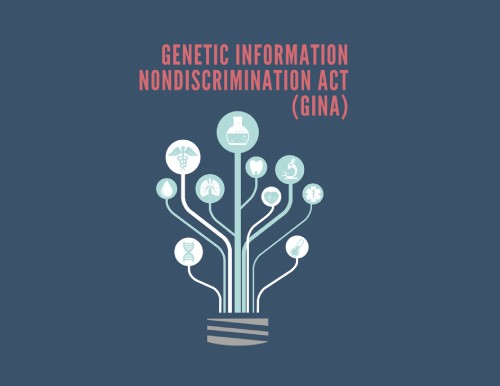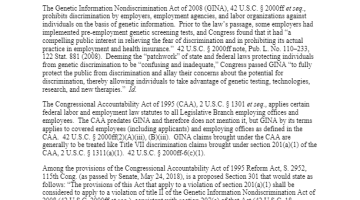I. Introduction
The Genetic Information Nondiscrimination Act of 2008 (GINA), 42 U.S.C. § 2000ff et seq., prohibits discrimination by employers, employment agencies, and labor organizations against individuals on the basis of genetic information. Prior to the law’s passage, some employers had implemented pre-employment genetic screening tests, and Congress found that it had “a compelling public interest in relieving the fear of discrimination and in prohibiting its actual practice in employment and health insurance.” 42 U.S.C. § 2000ff note, Pub. L. No. 110–233, 122 Stat. 881 (2008). Deeming the “patchwork” of state and federal laws protecting individuals from genetic discrimination to be “confusing and inadequate,” Congress passed GINA “to fully protect the public from discrimination and allay their concerns about the potential for discrimination, thereby allowing individuals to take advantage of genetic testing, technologies, research, and new therapies.” Id.
The Congressional Accountability Act of 1995 (CAA), 2 U.S.C. § 1301 et seq., applies certain federal labor and employment law statutes to all Legislative Branch employing offices and employees. The CAA predates GINA and therefore does not mention it, but GINA by its terms applies to covered employees (including applicants) and employing offices as defined in the CAA. 42 U.S.C. § 2000ff(2)(A)(iii), (B)(iii). GINA claims brought under the CAA are generally to be treated like Title VII discrimination claims brought under section 201(a)(1) of the CAA, 2 U.S.C. § 1311(a)(1). 42 U.S.C. § 2000ff-6(c)(1).
Among the provisions of the Congressional Accountability Act of 1995 Reform Act, S. 2952, 115th Cong. (as passed by Senate, May 24, 2018), is a proposed Section 301 that would state as follows: “The provisions of this Act that apply to a violation of section 201(a)(1) shall be considered to apply to a violation of title II of the Genetic Information Nondiscrimination Act of 2008 (42 U.S.C. 2000ff et seq.), consistent with section 207(c) of that Act (42 U.S.C. 18 2000ff–6(c)).”

